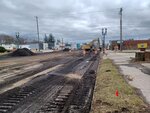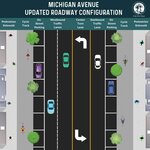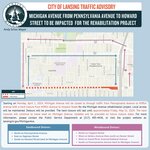



THURSDAY, April 4 — As construction crews began breaking up the asphalt on a closed strip of Michigan Avenue between Mifflin Avenue and U.S. 127 in Lansing on Monday, it didn’t take long for local business owners to notice a dip in customers.
It’s the first phase of Lansing’s $14 million Michigan Avenue Rehabilitation Project, a street revitalization plan that will close portions of Michigan from Howard Street through Pennsylvania Avenue in six phases through mid-October next year.
One of the first businesses to feel the effect is The People's Kitchen, 2722 E. Michigan. The restaurant, between Charles and Detroit streets, will have its main entrance off Michigan cut off through May 31 as part of the project’s first phase.
“It’s already impacted our business,” managing partner Douglas Mulkey said. “Being close to Howard Street, we’re on the front end of this construction process, so it’s certainly made a difference in just a few days.”
Mulkey said the city notified him of the plan in writing last April. When January rolled around, he held staff meetings to discuss how The People’s Kitchen could minimize the process's impact on business.
“We knew it was coming soon, so we set aside some time to talk about our contingency plans and how we were going to go about doing outreach. Ultimately, about all we could do is just make guests aware that construction is occurring, offering birds-eye-view maps and signage outside of the restaurant to let them know that we are still open,” Mulkey said.
The plan calls for Michigan Avenue’s reconfiguration from five lanes to four — two westbound lanes, one eastbound lane and a center turn lane. New bike lanes are set to go in on each side of the street on the same level as the sidewalks. The road will be fully repaved, with sidewalk replacement, traffic signal upgrades and water main and utility improvements on the docket.
The work will encompass six phases, starting with the current closure between Mifflin and Howard, which will end on May 31. The second phase, starting at Mifflin and moving west to Hayford Avenue, will occur between May 28 and Aug. 10. The third phase, between North Magnolia and Horton avenues, will commence immediately after that and continue through Nov. 25.
From there, crews will take a break through March of next year before they continue westward until they reach Pennsylvania Avenue during the sixth phase. Andy Kilpatrick, Lansing’s public service director, said the project finish date is Oct. 17, 2025.
“The work will essentially be concurrent between phases. As the project moves west, the hard closure area will move with it,” Kilpatrick said. “The road will be back open to traffic at the end of the construction season over the winter, but traffic will not be able to go all the way through the corridor while work is actually being done.”
To date, the most visible change has been the absence of the trees on both sides of Michigan Avenue. Crews began cutting them down last month, leaving only stumps behind.
“They needed to be relocated because they were in conflict with either the existing sidewalk or the planned cycle track. Right now, there are trees that are in the walking path on the sidewalk that take up a lot of that space where pedestrians walk,” Kilpatrick said.
As is the case with other road projects, Kilpatrick said the city will plant new trees between the newly constructed bike lanes and the curb after the work is finished.
“We’ll actually be adding more trees. Obviously, they won’t obviously be the same size, but there will be more trees after the project than there are currently,” Kilpatrick said.
Kilpatrick said the city wanted to increase walkability and further promote nonmotorized modes of transportation by replacing the sidewalks and adding bike lanes.
“Every time we do a major project, we look to see if there are ways we can add bike infrastructure, and this is obviously an important corridor where we wanted to include that,” he said.
“We have Kalamazoo Street to the south that does have bike lanes, but we really have nothing north of that,” Kilpatrick added. “This will add another corridor into downtown, and it will also connect directly to the river trail at the east end of Michigan Avenue.”
The project is expected to cost $14.1 million, with more than half from federal funds.
Kilpatrick noted that figure “is almost guaranteed to change,” depending on variables like the volume of asphalt and other bulk construction materials.
“I've never had a project where it's exactly to the dollar of what the estimate is, but this is the closest estimate we have right now,” he explained.
In the meantime, Mulkey said he and other business owners will simply have to make do with the hand they’ve been dealt.
“We hoped construction might have been a little bit less — maybe down to one lane so we could still have some traffic going. As that construction moves west, I'm anticipating that the impact it has on the businesses will lessen. But, at this present moment, we are fortunate enough to at least have access to the byways via Detroit, Prospect and Kalamazoo streets,” Mulkey said.
While he noted that he was “upset” about the trees coming out, Mulkey said he otherwise understands why the improvements were necessary.
“Being a lifetime lifelong Michigander, I'm no stranger to road construction,” he said. “As a community, we certainly want quality roads, and construction is ultimately an inevitable part of us getting there.”
Support City Pulse - Donate Today!
Comments
No comments on this item Please log in to comment by clicking here